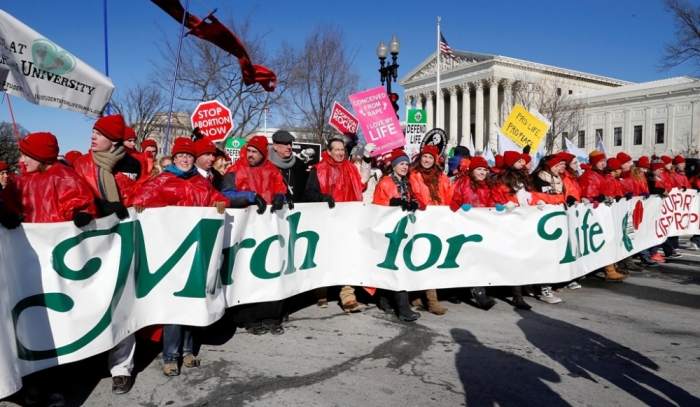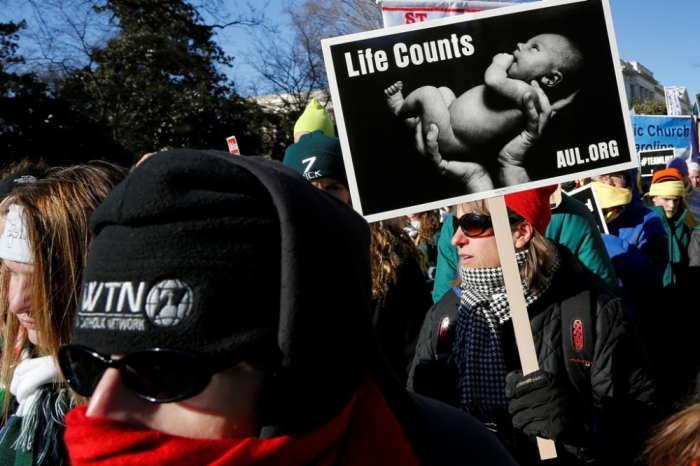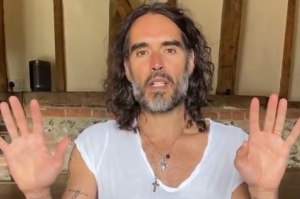March for Life: 42 Years After Roe v. Wade, Half of Americans Say Abortion Is Morally Wrong

Hundreds of thousands of pro-life advocates are in Washington Thursday to peacefully protest against the Supreme Court's decision in Roe v. Wade 42 years ago that made abortion legal in the United States.
This year, as protesters walk along Constitution Avenue in the 42nd annual March for Life rally, members of the House had planned to be voting on a bill that would ban most abortions after 20 weeks of pregnancy, but due to objections among some Republican members to a rape reporting provision in the bill that vote has been delayed.
Instead, members will be voting on a bill sponsored by Rep. Chris Smith, R-N.J., that would block taxpayers' dollars from being used to pay for abortion services under health insurance plans purchased on the federal exchange. The bill would also require health insurances offered on the exchange to disclose whether they cover abortion services or have a surcharge fee that goes to abortion providers before consumers select their coverage.
The Christian Post reported in November that a report from the Government Accountability Office reveled that over 1,036 Obamacare plans in 28 states cover elective aboritons.
"Health consumers are almost clueless as to which plans fund abortion on demand and which do not," said Smith, co-chair of the bipartisan congressional pro-life caucus, who noted on the House floor Thursday that 68 percent of Americans oppose taxpayer funding of abortions, according to a Knights of Columbus-Marist poll released Wednesday.
Among the millennial generation, 71 percent of those polled said they oppose taxpayer-funding of aboriton, compared to just 28 percent who support federal funding of abortion.
The Marist poll released Wednesday also found that "Eighty-four percent of Americans want significant restrictions on abortion, and would limit it to, at most, the first three months of pregnancy. This includes almost seven in 10 (69 percent) who identify themselves as 'pro-choice.'"
Other findings of the Knights of Columbus-Marist poll reveal that 64 percent of respondents said they believe the abortion rate is too high; 78 percent support parental notification before a minor can obtain an abortion; and 59 percent agree that abortion causes more harm to a woman's overall health.
Regarding Americans' views on abortion, a Pew Research Center blog published Wednesday titled "5 Facts About Abortion" noted that 49 percent of Americans believe that abortion is morally wrong, which is based on polling data collected in 2013. Broken down by religious affiliation of believers and non-believers, Pew found that "75 percent of white evangelical Protestants said that having an abortion is morally wrong, [while only] 25 percent of religiously unaffiliated people say so."
Each year the March for Life rally is held, an increasing number of millennials are joining the demonstration to voice their opposition to abortion, which they say is because the procedure has killed friends and family members they never got the chance to meet, as well as the person God created for them to marry.
According to Gallup polling data taken over the last decade, millennials are more pro-life and supportive of restrictions on abortion than their parents' generation. Subsequently, millennials' beliefs on abortion are more in-line with their grandparents' generation which is also largely opposed to abortion.

Kathryn Brown, a Benedictine College student who was among 400 of her classmates who traveled from Kansas to Washington last January to lead the 41st annual March for Life demonstration, told CP that her generation is more pro-life than past generations because they've been greatly impacted by abortion.
"I think one big reason is because our generation is the one that's missing so many people because of abortion," Brown commented. "There are many people, college aged, who have siblings who were aborted. There are people missing in our lives because they were never given the chance to live — siblings, friends, maybe even people we would have married. We mourn them and we resolve to stand up for their God-given right to life so that others will not share that same fate."
The theme of this year's march falls under the banner of "Every Life is a Gift" in defense of pre-born babies that receive a difficult prenatal diagnosis, such as Down syndrome, Trisomy 13 or 18, and Spina Bifida, and are more likely to be aborted.
"We're focusing on a group of children who are much more likely to be killed in the womb than healthy children," pro-life activist Lila Rose told CP in a statement last month.
Jeanne Monahan-Mancini, president of the March for Life Education and Defense Fund, previously shared with CP that among the reasons why people, especially those in millennial generation, are witnessing a cultural shift toward supporting the pro-life movement opposed to advocating for abortion, are the advances in technology and the human aspect — the personal stories of men and women who've been harmed by the aftermath of abortion.
"Years ago, it was the case that advocates for abortion would talk about the 'thing' growing in a woman's womb as a lifeless blob of tissue," Monahan-Mancini explained. "And I think our advances in sonography and ultrasounds, and even our understanding of fetal development has dispelled those myths."
She continued, "We know that, from the moment of conception, a baby has all of its DNA that it needs for the rest of its life. It has everything inherent that it will need for later on. Really, the only difference [between the preborn and adults] is in size and development."
March for Life is the largest annual event in Washington and is held every year on the anniversary of Roe v. Wade. The organization is bi-partisan and therefore includes participants from both political parties. Leading this year's congressional delegation in the March for Life will be Sen. Tim Scott, R-S.C., the first African-American pro-life senator; Rep. Dan Lipinski, D-Ill., co-cair of the congressional pro-life caucus; and House GOP Conference Chair Cathy McMorris-Rodgers, R-Wash., among others.






























